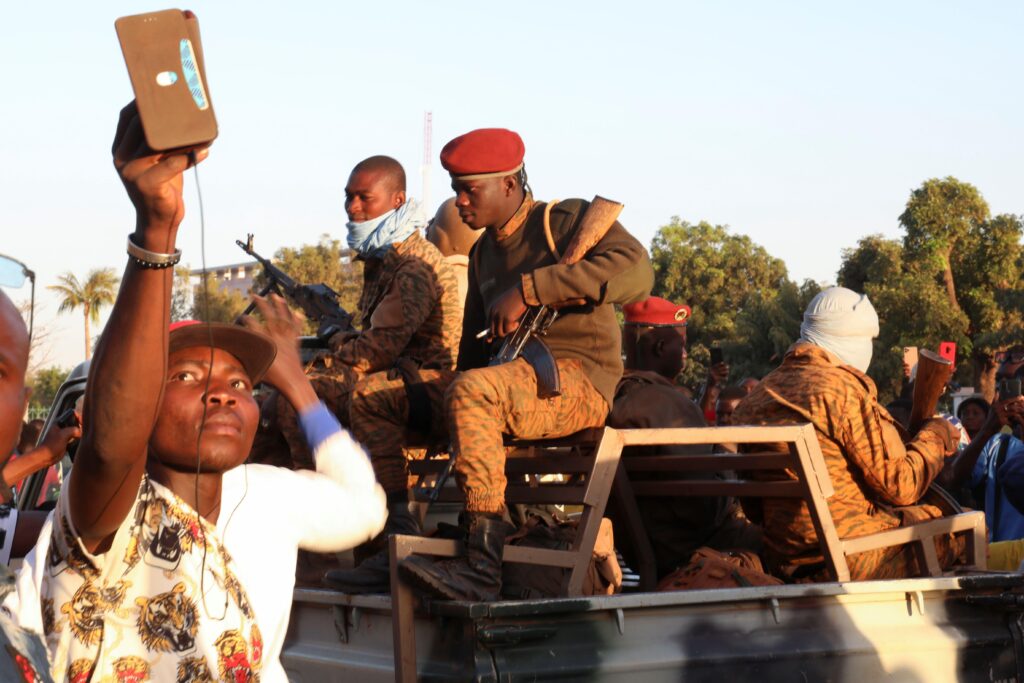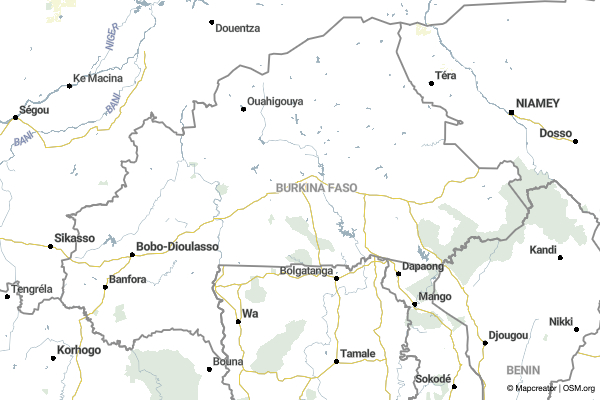In Burkina Faso, the Army has staged a coup against President Kaboré and established military rule. Yet, what seemed like a spontaneous revolt against a democratically elected government, has deeper roots in the country’s fight against Islamism and poverty. And now Russia is stepping in.

The recent military overthrow of President Kaboré in Burkina Faso was inevitable, unleashed by an outpouring of anger and frustration from both the people and the army forces.
The coup has raised the lid on the many factors over why it happened. The causes include unemployment, an increasingly violent jihadist threat, weak leadership and government. All this has been exacerbated by the pandemic, causing further economic hardship for the people.
The latest crisis cannot be separated from conflict in other countries. It’s an area plagued by army mutinies and military coups with similar events taking place in Chad, Mali and Guinea. Post-colonial Africa has witnessed more than 200 coup attempts, with almost 50% successful in removing leaders.
The latest coup has been a long time brewing. Dissatisfaction with President Kaboré for his inability to deal with several issues created a perfect storm for civilians backing the military to overthrow the ruling People’s Movement for Progress (MPP), headed up by Kaboré, its founder, in power since 2015.
Events unfolded rapidly in a series of events starting on 22 January, with a banned protest over the government’s handling of the jihadist threat. The following day, soldiers mutinied at several army barracks over lack of training and lack of food rations, as well as for better equipment to fight against armed jihadists.
“We want adequate resources for the battle” against the militants, a soldier from the Sangoule Lamizana base said, according to AFP. An army marches on it stomach and there were reports of soldiers without food rations for two weeks, adding to the growing discontent.
The army had the support of the general public, with hundreds of protestors taking to the streets, culminating in setting on fire the headquarters MPP, the ruling party in Ouagadougou, the capital city.
The decisive moment came on 24 January, with the overthrow of Kaboré and his cabinet. A military junta, headed by 41-year-old Lieutenant Colonel Paul-Henri Sandaogo Damiba seized control, dissolving the government and closing the borders.
The whereabouts of the former president are unknown, although reports suggest he is held at an army camp. However, photos of a vehicle, which may have belonged to Kaboré, shows blood-spattered seats and bullet-riddled windows.
“President Kaboré is physically well, but I cannot say anything about his state of mind,” said a source from Kaboré’s People’s Movement for Progress (MPP) party.
The aims of the military junta are unclear. On a TV broadcast, Damiba, surrounded by fellow armed militia in camouflage uniforms announced the formation of a new organization called the Patriotic Movement for Safeguard and Restoration (MSPR). “MSPR which includes all sections of the army, has decided to end President Kaboré’s post today”, adding that the military junta wanted to restore “constitutional order”. Clearly, the army felt that President Kaboré and his government was failing to provide this.
In his first speech since the putsch, Damiba spoke on national television. “In its history, our country has rarely been confronted with adversity. But more than six years now our people have been living under the yoke of an enemy that succeeded,” said the new leader, speaking from the presidential palace.
Damiba also promised a return to normal constitutional order “when the conditions are right”. He is also due to meet a group of trade unions and other organisations, according to a Reuters report.

It’s a safe assumption that jihadist militants are the “enemy” Damiba refers to. There is huge fury and fear over the killings of civilians and soldiers by armed groups including those linked to ISIL and an al-Qaeda-linked group, Jama’at Nasr al-Islam awl Muslimi (JNIM).
Attacks in southwestern Burkina Faso have doubled in recent years. There were eight main attacks in 2020 and four in 2019, according to the Armed Conflict Location & Event Data Project (ACLED).
Locals say the jihadists are everywhere, causing terror and insecurity. The military seem powerless to defend the people from the jihadists, let alone themselves. On 14 November 21, a jihadist attack near a goldmine in Inata, northern Burkina Faso, killed 49 military police officers and four civilians.
The following week, hundreds of protestors took to the streets, already calling for the resignation of President Kaboré.
Lack of confidence in the government and previous army mutinies have contributed to the rise of the Islamic insurgency. The jihadist militants, although often disparate, disorganised and beset by in-fighting, have some common aims and objectives.
Poverty among the people often drives them into fighting for the militants. Real GDP grew by just 1.9% in 2020, while inflation rose 3.2%, according to the World Bank, with around 40.1% of the population living below the poverty line.
World Food Programme (WFP) spokeswoman Marwa Awad warned about rising recruitment, as “…people here have told us they are seeing the exploitation of inequality, with young people joining armed groups.”
Sam Mednick, an Al Jazeera journalist, talked to a woman who witnessed an attack in which around 150 people were killed. The woman reported being surrounded by seven children with guns so heavy they had trouble holding them upright.
Attacks are focusing on mines, in particular gold mines. These are a source of income for the armed groups, and there are reports that miners are being forced to sell gold to them with demands for a “protection tax” from workers living near the mines.
“Terrorist attacks on artisanal gold mines in Burkina Faso are frequent because gold is very important for the survival of the armed groups,” Burkina Faso political analyst Lionel Bilgo told DW Africa.
The armed forces have gained around $121 million dollars by attacking the mines since 2016, say the Economic and Social Observatory of Burkina Faso.
The mines are often owned by foreign countries, adding to the anger of the Islamists who have vowed to establish a caliphate and to fight against Western interests. ISIL and al-Qaeda have declared their intentions to attack foreign targets in North and West Africa.
After an attack on August 31 2021, assailants fired on a convoy belonging to Canadian-owned Essakane gold mine. Iamgold, the mine owner, suspended all convoys travelling to and from the mine which produced 364,000 ounces of gold in 2020.
Human rights organisations and security experts fear a return to military regimes in Africa. Democracy on the continent is not in a good place at the moment, Cheta Nwanze of SB Morgen Intelligence, told local media. In “Burkina Faso, we have seen people come out on the streets to celebrate the coups shows that people are fed up with democracy,’’ he added.
Hundreds of citizens reacted to the downfall of the democratically elected government with cheering, singing and dancing.
“I’m happy to be here this morning to support the junta in power. We wish that terrorism be eradicated in the months or the years to come,” said one protestor, attending a rally Ouagadougou.
There is increasing disaffection with the inability of Western countries to help the Burkinabese deal with the increasingly violent Islamist insurgency. As of July 2021, more than 1.3 million people—six percent of the country’s population—have been displaced inside Burkina Faso in just over two years, according to the UN Refugee Agency.
There is a growing anti-French sentiment, the colonial power who held control until Burkina Faso’s independence in 1960. Protestors at the recent rallies held up signs saying, “France, get out!”
Leaders of the Economic Community of West African States (ECOWAS) have condemned the coup, but hundreds of people gathered at the Burkina Faso capital said the bloc was not on their side, chanting “Down with ECOWAS”.
Some supporters showed African unity, by waving the flags of their neighbouring country Mali, together with pictures of Mali’s junta ruler, Colonel Assimi Goita, beside Damiba, Burkina Faso’s new military leader. Many people feel that military rule is the only way to rid the country of Islamic insurgents and deal with other issues such as unemployment and government corruption.
“Coup leaders tend to stick together — especially in the face of sanctions from their traditional allies,” said Aanu Adeoye, a Russia-Africa researcher at the Chatham House think tank in London. “If they don’t get help from the French, for example, there is a group of Russian mercenaries waiting.”
Alexander Ivanov, the official representative of Russian military trainers in the Central African Republic, is known to have issued a statement offering training to the Burkinabe military, according to a Voice of America report.
All of this points to the increasing dissatisfaction of Burkina Faso with Western powers.
“We want a partnership with Russia,” said one supporter of the new military junta. “Long live Russia!” he said.
Fiona Keating is a freelance journalist and editor, and has worked at the Independent and the Guardian, as well as OpenDemocracy. She specialises in world news and affairs as well as women’s issues, health, history and science. She was an editor at International Business Times, managing a team of journalists to create original content, breaking news and articles on current events.







